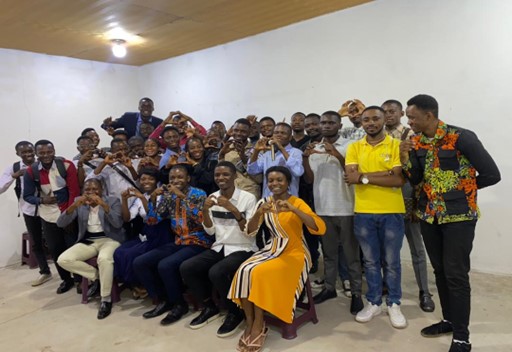Mosaïque-Congo: Empowering Congolese Youth for a Better Future
In the heart of the Democratic Republic of the Congo (DRC), a country known for its vast natural resources yet plagued by extreme poverty, a group of young, passionate leaders is making strides toward uplifting their community. Over the last few weeks, I have received the opportunity to interview and become better acquainted with Christian Eloso, founder of Mosaïque-Congo – one such initiative that seeks to address the pressing challenges faced by Congolese youth, particularly those who are disadvantaged and living with disabilities. Their work aligns closely with the United Nations Sustainable Development Goal (SDG) 1: No Poverty, by addressing the systemic issues that contribute to poverty and creating opportunities for youth empowerment.
The Reality of Poverty in the DRC
According to the World Bank, the DRC is one of the poorest countries in the world, with over 73% of the population living on less than $2.15 per day (World Bank, 2023). This staggering statistic highlights the extreme poverty that affects millions of Congolese, including the youth who make up more than 60% of the population (UN, 2023). These young people face significant barriers to accessing education, healthcare, and employment, perpetuating a cycle of poverty that is difficult to escape.
As Christian explains during a board meeting, the situation is even more dire for young women and those with disabilities, who are disproportionately affected by discrimination and social exclusion. Many young girls in the DRC are subjected to early pregnancies, gender-related violence, and poor health outcomes, while boys are often abandoned to the streets, where they may turn to crime or other forms of deviance. These challenges not only hinder their potential but also diminish their ability to actively contribute to their communities.
Mosaïque-Congo’s Mission: Breaking the Cycle of Poverty
In the University of Kinshasa, Christian established Mosaïque-Congo to address these challenges and provide support to marginalized youth in the DRC. His approach is multi-faceted, as he works with young people from all backgrounds, helping them overcome the barriers they face due to poverty, disability, and discrimination by equipping youth with the skills, resources, and support needed to escape poverty and build better futures for themselves and their communities.
Key Areas of Intervention and Vision
- Education and Training Vision: Mosaïque-Congo advocates for tutoring and educational programs that support young people, especially those with disabilities, to succeed academically.
- Healthcare and Well-being Vision: Mosaïque-Congo believes in the importance of advocating to improve healthcare access for youth, especially young mothers.
- Social and Professional Integration and Gender Equality Vision: Christian Communicated that Mosaïque-Congo is working on initiatives to teach life-essential skills to youth, especially those living in poverty on the streets. These programs aim to reduce gender inequality by supporting both girls and boys, with a focus on helping girls who are most disadvantaged in these situations.
Real Impact: Projects and Research
Since its inception, Mosaïque-Congo has been involved in several impactful projects. One of the key initiatives was a research project in the Mbanza-Lemba district, which identified the severe poverty and social exclusion faced by the local youth. Christian documents that the study revealed that many young people in this area were forced into child labor or faced health issues due to poor access to healthcare and education.
In response, Mosaïque-Congo launched awareness campaigns to combat environmental degradation in the area, teaching young people how to participate in anti-erosion activities. This environmental initiative not only empowers youth but also encourages them to take an active role in improving their communities.
Looking Ahead: A Vision for 2025
Mosaïque-Congo’s vision for 2025 is to continue championing an inclusive world where all young people, regardless of socioeconomic status, gender, origin, or disability, have access to opportunities for growth, education, and healthcare. As Christian often elucidated in board meetings, the aim is beyond aligning with the United Nations’ sustainable development goals – it is about helping the vulnerable youth in the DRC break the cycle of poverty.




